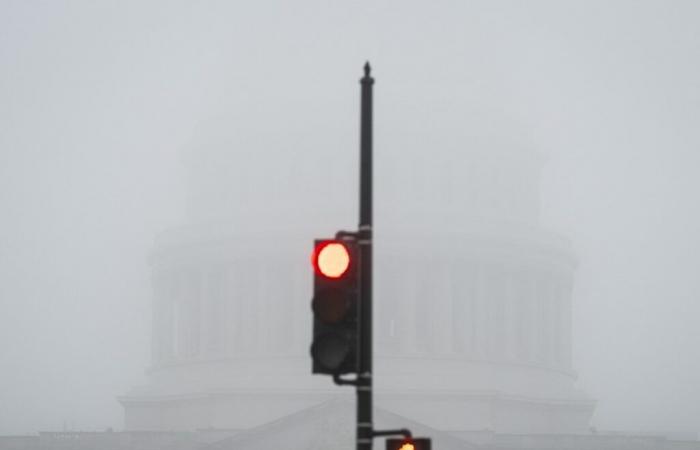Keystone-SDA
The United States finds itself on the verge of budgetary paralysis on Friday after the successive failures of several texts in Congress, and while no solution to the crisis is in sight for the moment.
This content was published on
December 20, 2024 – 3:58 p.m.
(Keystone-ATS) At midnight local time (05:00 GMT Saturday), the federal state will find itself in an effective “shutdown” situation. The result: technical unemployment for hundreds of thousands of civil servants, the freezing of several social benefits and the closure of certain nurseries.
An extremely unpopular situation with Americans, especially as Christmas approaches.
However, Congress was well on its way to avoiding this situation on Tuesday when the Republican President of the House of Representatives, Mike Johnson, announced that he had reached an agreement with the Democrats. This notably included more than 100 billion in aid to American regions recently devastated by natural disasters.
Alas, the negotiated agreement was torpedoed the next day by Donald Trump and Elon Musk.
The president-elect denounced a “ridiculous and extraordinarily expensive” text. His ally, the richest man in the world, had launched a virulent burst of posts on his social network X to express his opposition, urging elected officials to “kill the text”.
“President Musk”
The twist took Congress by surprise and gave a glimpse of a Trump 2.0 presidency even before the Republican took office on January 20. With a style – similar to his first mandate – not bothering with conventions, even if it means causing a certain chaos.
Elon Musk's resounding opposition also illustrated the growing influence of the boss of SpaceX and Tesla on major political decisions.
To the point, for some elected Democrats, of ironizing about a “President Musk”, to whom Donald Trump would be reduced to the role of vassal.
A way out of the impasse was glimpsed on Thursday when the president-elect gave his blessing to a new text, much less detailed, but which included a sine qua non condition for him: a postponement of the deadline on the debt ceiling of the United States until January 2027.
The United States has the particularity of regularly coming up against a legal constraint concerning its credit capacity: this debt ceiling, i.e. their maximum amount of debt, must be formally raised or suspended by Congress.
A suspension decided in 2023 expires at the beginning of January and the United States should reach the ceiling in June. Donald Trump therefore declared on Wednesday that he wanted to avoid, upon his return to power, this “vicious trap” set up, according to him, by the Democrats.
“Unacceptable”
But while two-thirds of the votes were necessary for adoption, the new text did not even reach a simple majority, with 38 Republicans joining the Democrats' “no”.
The course of action is now uncertain for Mike Johnson, pressed on the one hand by the Democrats to return to the negotiated agreement, and on the other by certain conservative elected officials who are refusing outright any text that does not include a budget cut for compensate for the new aid.
“If there is a 'shutdown' of the government, let it start now, under (President Joe) Biden, but not under 'Trump' (…) This is a problem that Biden must solve, but if the Republicans can help (…) they will! », wrote Donald Trump on his Truth Social platform Friday morning.
The leader of the Democrats in the House of Representatives, Hakeem Jeffries, denounced an “unacceptable” situation.
The “extreme” Trumpists do not have the “serious desire to help working-class Americans,” he said, accusing them of being “simply at the orders of their rich donors.”
For influential Republican elected official James Comer, if Congress adopts a budgetary text, “we will obviously have to have support on the Democratic side.”
Mike Johnson promised Thursday evening that elected officials would “come together and find another solution.”






